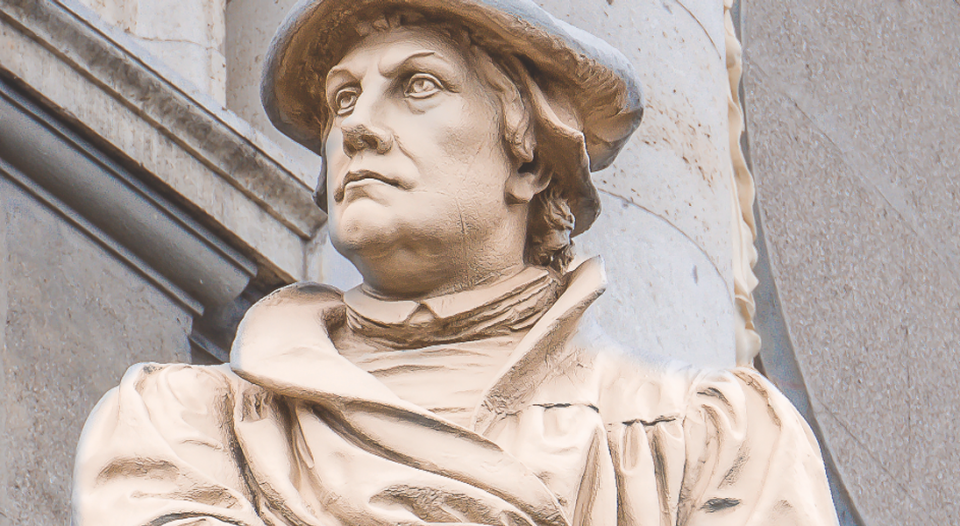Series editor’s note: Throughout 2020, “Deeper understandings” will engage the ELCA’s commitment to authentic diversity.
—Kathryn A. Kleinhans, dean of Trinity Lutheran Seminary at Capital University, Columbus, Ohio
The Freedom of a Christian is one of Martin Luther’s most popular writings and a classic of Christian spirituality. In it, Luther presents the most important themes of the Christian faith in a simple and clear way.
What does a treatise written by a German monk 500 years ago have to say to us today as we navigate a pandemic, Black Lives Matter, climate change, sexism, white supremacy, the plight of migrants and asylum-seekers, and so much more—in addition to our personal struggles with health, work and relationships?
Our bondage
Luther taught that all human beings are created in God’s image and therefore are inherently good. Yet human nature is distorted because of our bondage to sin, which results in the breakdown of community and in injustices and evil.
Imagine a dog with a juicy steak in its mouth staring down at a pond. Reflected on the surface, the dog sees another steak that is bigger and juicier than the one it already has—that’s how temptation works. The dog tries to snatch the reflected steak, but the moment it opens its mouth, the real steak falls into the pond and disappears. In going after the reflection, the creature ended up losing what it already had. That is the tragedy of the human condition and the beginning of our bondage to sin. We want to seize by violence or cunning what already belongs to us by grace: love.
Just as in an ideal marriage everything that belongs to each partner now belongs to the other, Luther says, so it happens between Christ and the believer.
When we don’t believe the amazing word proclaimed in the gospel, we spend our lives looking for substitutes to God’s love. We think in our hearts: if I could get that job, or find that partner, or get straight As, or have the “perfect body” or get rid of this compulsion, then I would be happy and fulfilled.
So we drop the steak. And in so doing we also risk turning others into mere objects meant to serve our needs. When taken to the extreme, that bondage to sin has resulted in things as horrible as slavery, sex trafficking, colonialism, mass incarceration and genocide.
Our freedom
The good news is that God’s ultimate response to sin is not punishment but healing, reconciliation and liberation. The word of God has the power to set us free and to empower us to work for the healing and liberation of creation and our neighbors.
The gospel is that God loves us all passionately. Luther uses the image of marriage to describe Christ’s love. Just as in an ideal marriage everything that belongs to each partner now belongs to the other, Luther says, so it happens between Christ and the believer. What once was ours now belongs to Christ and everything that is Christ’s now belongs to us also. Therefore, our sin is now Christ’s.
What does love look like in a society so divided by politics that even wearing a mask to protect our neighbors becomes a matter of conflict?
In turn, the believer receives all the beauty, love, holiness, righteousness and eternal life that belongs to Christ. Christ is ours and we are Christ’s! Luther called this the “happy exchange.” The fullness of the exchange only happens in eternity, but we can already enjoy it in anticipation by faith, in the expectation of hope, because God’s promises are trustworthy.
Our love
Love begets love. It’s impossible for true faith not to yield abundant fruits of love because it is by faith that we awaken to God’s abundant love for us in Christ—and love wants to love.
This is how Luther expresses it:
“Christian individuals do not live in themselves but in Christ and their neighbor, or else they are not Christian. They live in Christ through faith and in the neighbor through love.”
Love is the fruit of faith. Love is the mark of the true Christian.
What does love look like in times of a pandemic and injustices? What does love look like in the face of migrant children and families knocking at the doors of our borders, begging for asylum from unthinkable violence and poverty? What does love look like in a society so divided by politics that even wearing a mask to protect our neighbors becomes a matter of conflict? What love looks like concretely here and now is up to you—and to each of us.
The freedom of a Christian is the faith that we are accepted—even as unacceptable as we are, that God loves us with a parent’s fathomless love, and that even our feeble efforts at planting seeds of love will yield abundant fruits of justice and peace, because even though the concrete form that love takes is up to us, the harvest belongs to God. That is the freedom of a Christian.
Presiding Bishop Elizabeth Eaton has invited the church to study and reflect on The Freedom of a Christian in 2020, its 500th anniversary year. Learn more at elca500.org.




